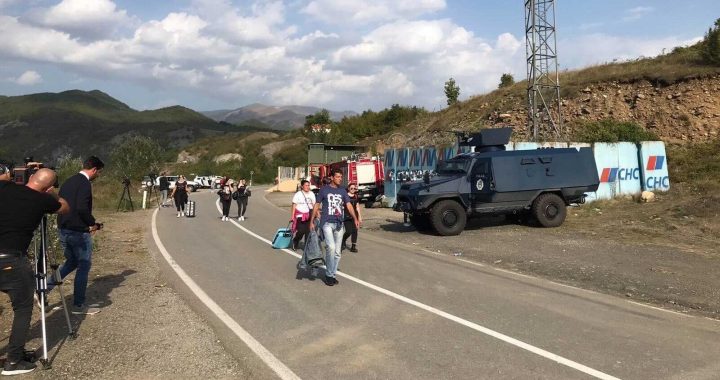

 The Jarinje border crossing blocked by Kosovo Serbs and with the pressence of Kosovo special police forces in September 2021. Photo: BIRN/Valon Fana
The Jarinje border crossing blocked by Kosovo Serbs and with the pressence of Kosovo special police forces in September 2021. Photo: BIRN/Valon Fana
An expert from North Kosovo said the test of the Kosovo-Serbia deal reached at the weekend on crossing borders with IDs will be how it works in practice.
It is “difficult to estimate when exactly implementation will begin”, Igor Markovic of the Mitrovica-based NGO Aktiv told BIRN about Saturday’s verbal agreement between Kosovo and Serbia on crossing borders using only IDs.
Serbia and Kosovo agreed that neither side will require any additional documents for border crossings, besides those that people already have, like IDs, it was announced on Saturday.
“Under the EU-facilitated Dialogue, Serbia has agreed to abolish the entry/exit documents for Kosovo ID holders and Kosovo agreed to not introduce them for Serbian ID holders,” Borell said.
“Kosovo-Serbs, as well as all other citizens will be able to travel freely between Kosovo and Serbia using the ID cards,” he added.
The deal was the first time Albin Kurti and Aleksander Vucic had agreed on something more than 13 months since they first faced each other in Brussels.
However, the deal is only an oral agreement. Serbia’s President Vucic clarified on Sunday that this is “an oral agreement, the [previous] one in writing was made in 2011”.
There is also no official information either on implementation. However, Markovic said: “Implementation itself will not require the introduction of special administrative measures or new bureaucratic practices on the part of Serbia, which will significantly contribute to the earliest possible start of the implementation of the agreement.”
He added: “The question is whether Serbia will definitely start implementing the agreement in light of the still missing compromise on the use of plates with city designations in Kosovo.”
Judging by previous statements from Serbia, the precondition for the rapid implementation of the agreement on IDs will be an agreement on number plates, he said.
Serbian President Vucic confirmed on Sunday: “There is no agreement on the issue of plates”.
The latest crisis in relations was triggered by a June decision of Kurti’s Kosovo government to change the current regime on IDs and number plates.
But Markovic says the problem with number plates is largely symbolic.
“For the Kosovo side, the existence of Serbian number plates with markings of cities in Kosovo is a relic of the past and an attack on its sovereignty, while for the Serbian side, the continued use of these plates is a symbolic act of the [state] presence of Serbia in Kosovo,” he explained.
29 August 2022 - 20:32

Kosovo PM Albin Kurti first came to power in a landslide win in 2021, ...

Kosovo marks the 18th anniversary of its declaration of independence w...

Albin Kurti secured his third term as Prime Minister, winning the back...

More than two years since the deal was made, EU Special Representative...